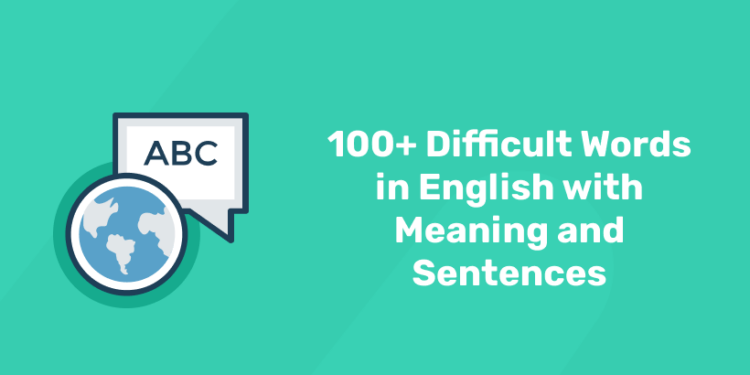English has many difficult words. It’s important to note that the difficulty of a word depends on a person’s level of familiarity with the language. However, some words can be considered difficult for their complex spelling, pronunciation, or meanings.In this article we will be discussing 100+ Difficult Words in English with Meaning and Sentences.
Learn Spoken English with Aparna Mulberry! Enroll Here!
100+ Difficult Words in English with Meaning and Sentences
Difficult words in English are words that are challenging to read, write, pronounce, or understand. The difficulty of a word can depend on factors such as its length, complexity, or unfamiliarity. For example, some English words may have complex meanings that are not understood by someone who is unfamiliar with them. Other words may have irregular spelling or be pronounced differently than they are spelled, making them difficult to read/write.
Furthermore, some words may be considered difficult because they are technical terms or specific to a certain field or profession. For example, medical or scientific terms may be difficult for someone who is not familiar with the terminology. Similarly, legal terms or jargon used in the field of finance may be difficult for someone who doesn’t work in those areas.
When are the Words Considered Difficult?
Words can be considered difficult in English for several reasons. Here are some common factors that contribute to the difficulty of a word:
Complex spelling:
Words with irregular spelling or many silent letters can be difficult to spell correctly. For example, “colonel” is pronounced “kernel.”
Pronunciation:
English has many words that are pronounced differently than they are spelled, which can make them difficult to pronounce. For example, “schedule” can be pronounced “shed-yool” or “sked-yool.”
Meaning:
Some words have complex or abstract meanings that are difficult to understand. For example, “existential” refers to questions about the nature of existence and the human condition.
Unfamiliarity:
Words that are not commonly used or are specific to a certain field or profession can be difficult for people who are not familiar with them. For example, “herpetology” is the study of reptiles and amphibians.
Length:
Longer words can be difficult to read or write quickly, especially if they are not broken down into smaller parts. For example, “antidisestablishmentarianism” is 28 letters long and refers to a political movement.
What are the Benefits of Learning Difficult Words?
Learning difficult words can have several benefits, including:
Improved vocabulary:
Learning difficult words can expand your vocabulary and help you better understand complex texts. This can enhance your reading and make it easier for you to communicate effectively in both written and oral contexts.
Enhanced cognitive function:
Learning difficult words requires concentration and memory. This can help to improve cognitive function and increase mental agility.
Increased confidence:
Being able to understand and use difficult words can give you confidence in your communication skills. It also helps you in expressing yourself more effectively in a variety of contexts.
Improved academic performance:
Learning difficult words can improve your performance in academic settings. Like in exams or written assignments, where a strong vocabulary can be an asset.
Better career prospects:
Certain fields and professions require a high level of vocabulary and communication skills.Learning difficult words can help you to stand out in these areas and increase your career prospects.
Difficult Words in English with Meaning and Sentences
Here are 100+ of the most difficult words in English, along with their meanings and example sentences:
| Sl.No | Difficult Word | Meaning | Sentence |
| 1. | Anathema | something or someone that is intensely disliked or cursed | The dictator was anathema to the citizens, who protested his oppressive regime. |
| 2. | Abstemious | refraining from indulgence, especially in food or drink
|
The marathon runner had an abstemious diet to maintain his physical fitness. |
| 3. | Abstruse | difficult to understand or comprehend
|
The philosophy professor’s lecture was so abstruse that few of the students were able to follow it. |
| .4. | Acerbic | sharp, biting, or sour in tone or taste | The critic’s acerbic review of the movie left the director feeling insulted |
| 5. | Auspicious | showing signs of success or good fortune
|
The couple’s wedding day was an auspicious occasion, with beautiful weather and many happy guests. |
| 6. | Belligerent | hostile or aggressive
|
The belligerent behavior of the soccer fans led to a violent altercation. |
| 7 | Bellicose | inclined to fight or engage in war
|
The general’s bellicose attitude was a cause for concern among his subordinates. |
| 8 | Byzantine | complex or intricate, usually relating to political or bureaucratic systems | The Byzantine nature of the government’s tax code made it difficult for many people to file their taxes accurately.
|
| 9 | Bombastic | using inflated language or pompous speech to impress others | The politician’s bombastic speech failed to resonate with many voters, who found it insincere. |
| 10. | Brobdingnagian | gigantic or enormous in size | The new skyscraper was a brobdingnagian structure that dwarfed the surrounding buildings. |
| 11. | Circumlocution | the use of many words to express an idea, often in a roundabout or indirect way | The politician’s circumlocution in answering the reporter’s question was frustrating to many viewers. |
| 12. | Capricious | prone to sudden and unpredictable changes in behavior or mood | The boss’s capricious decision-making made it difficult for employees to anticipate his reactions. |
| 13. | Cacophony | a harsh, discordant mixture of sounds | The construction site was filled with the cacophony of jackhammers, drills, and heavy machinery. |
| 14. | Cogent | clear, logical, and convincing | The lawyer’s cogent arguments swayed the jury in favor of his client. |
| 15. | Conflagration | a large, destructive fire | The city was devastated by a conflagration that burned down several historic buildings. |
| 16. | Diaphanous | light, delicate, and translucent | The bride’s dress was made of diaphanous fabric that shimmered in the sunlight. |
| 17. | Discombobulate | to confuse or disorient | The unexpected news discombobulated the entire team, making it difficult for them to focus on their work. |
| 18. | Demagogue | a leader who appeals to people’s emotions and prejudices in order to gain power | The charismatic demagogue rose to power by exploiting people’s fears and resentments. |
| 19. | Diffident | lacking in confidence or self-assurance | The shy student was diffident in class and rarely spoke up during discussions. |
| 20. | Defenestration | the act of throwing someone or something out of a window | The story of the defenestration of Prague, in which several government officials were thrown out of a window during a riot, has become a legendary event in Czech history. |
| 21. | Epistemology | the branch of philosophy concerned with the theory of knowledge | The professor’s lecture on epistemology was challenging, but also fascinating. |
| 22. | Ephemeral | lasting for a very short time | The beauty of cherry blossoms is ephemeral, as they only bloom for a few weeks each year. |
| 23. | Esoteric | intended for or likely to be understood by only a small number of people with a specialized knowledge or interest | The book’s esoteric subject matter made it difficult for most readers to understand. |
| 24. | Exacerbate | to make a problem, bad situation, or negative feeling worse | The manager’s harsh criticism only served to exacerbate the employee’s frustration. |
| 25. | Euphemism | a mild or indirect word or expression used in place of one considered to be too harsh or blunt | “Pass away” is a euphemism for “die” that is often used to soften the impact of the word. |
| 26. | Fiduciary | relating to the responsibility of one person or organization to act in the best interests of another | The financial advisor had a fiduciary duty to manage his clients’ investments responsibly.
|
| 27. | Furtive | attempting to avoid notice or attention, typically because of guilt or a belief that discovery would lead to trouble | The furtive glances of the suspect made the police officer suspicious.
|
| 28. | Facetious | treating serious issues with inappropriate humor or levity | The CEO’s facetious response to concerns about the company’s finances did not inspire confidence among investors. |
| 29. | Fatuous | silly or pointless, especially in a smug or self-satisfied way | The celebrity’s fatuous comments on social media were widely criticized for their lack of substance. |
| 30. | Feckless | lacking in efficiency or effectiveness; incompetent or lazy | The feckless manager failed to address the problems within his team, leading to low morale and poor performance. |
| 31. | Gargantuan | extremely large or massive | The gargantuan skyscraper dwarfed all the other buildings in the city. |
| 32. | Gregarious | fond of company; sociable | The gregarious host made sure that all of his guests felt welcome and included. |
| 33. | Grandiloquent | using fancy, pompous words or language to impress others | The politician’s grandiloquent speech was criticized for its lack of substance. |
| 34. | Gauche | lacking social grace or tact; awkward | The new employee’s gauche behavior at the company party made many of his coworkers uncomfortable. |
| 35. | Gossamer | a fine, filmy substance consisting of cobwebs spun by small spiders, or a delicate, light fabric | The ballerina’s tutu was made of gossamer fabric that floated gracefully as she danced.
|
| 36. | Hierarchy | a system or organization in which people or groups are ranked one above the other according to status or authority | The military operates on a strict hierarchy, with officers giving orders to those of lower rank. |
| 37. | Hyperbole | exaggerated statements or claims not meant to be taken literally | The comedian’s use of hyperbole was part of his signature style, often making the audience laugh out loud. |
| 38. | Histrionic | overly theatrical or melodramatic in character or style | The actor’s histrionic performance drew mixed reviews from the critics. |
| 39. | Hegemony | leadership or dominance, especially by one country or social group over others | The United States’ cultural hegemony has had a significant impact on popular culture around the world.
|
| 40. | Hapless | unlucky or unfortunate | The hapless traveler missed his flight due to a series of unexpected delays and cancellations. |
| 41. | Iconoclast | a person who attacks cherished beliefs or institutions | The artist was an iconoclast who challenged traditional notions of beauty in her work. |
| 42. | Ineffable | too great or extreme to be expressed or described in words | The beauty of the sunset was ineffable, leaving the onlookers speechless. |
| 43. | Inexorable | impossible to stop or prevent | The inexorable march of time waits for no one, reminding us that life is fleeting. |
| 44. | Inscrutable | impossible to understand or interpret | The politician’s motives were inscrutable, leaving many people wondering what she was really up to |
| 45. | Intrepid | fearless, adventurous, or bold | The intrepid explorer ventured into the unknown, discovering new lands and encountering new cultures along the way. |
| 46. | Juxtaposition | the fact of two things being seen or placed close together with contrasting effect | The juxtaposition of the old and new buildings in the city skyline was striking. |
| 47. | Jaundiced | affected by bitterness, resentment, or envy | The jaundiced journalist wrote a scathing review of the new movie, focusing only on its flaws. |
| 48. | Jocund | cheerful and lighthearted | The jocund atmosphere of the party lifted everyone’s spirits. |
| 49. | Juggernaut | a huge, powerful, and overwhelming force or institution | The tech company had become a juggernaut, dominating the market and acquiring its competitors. |
| 50. | Jingoistic | extreme patriotism, often marked by aggressive or warlike foreign policy | The politician’s jingoistic rhetoric drew criticism from those who believed in a more diplomatic approach to foreign affairs.
|
| 51. | Kinetic | relating to or resulting from motion | The kinetic energy of the moving car was converted into heat when it hit the brakes. |
| 52. | Kowtow | to act in an excessively subservient or obedient manner | The intern was constantly kowtowing to the boss, hoping to earn a promotion. |
| 53. | Kismet | destiny or fate | They met by chance, but it seemed like kismet that they were meant to be together. |
| 54. | Kafkaesque | relating to the nightmarish world depicted in the works of Franz Kafka, marked by surreal or illogical elements | The bureaucracy of the government agency was so convoluted and confusing that it felt like a Kafkaesque nightmare. |
| 55. | Kinesiology | the study of human movement and the mechanics of body parts during motion | The kinesiology class examined the way that muscles and bones work together to produce movement in the body. |
| 56. | Labyrinthine | complicated and difficult to navigate; resembling a labyrinth | The labyrinthine structure of the old building made it easy to get lost. |
| 57. | Laconic | using few words; terse | The laconic speaker delivered his message in just a few brief sentences. |
| 58. | Languid | lacking energy or vitality; slow and relaxed | The hot summer day made everyone feel languid and lethargic. |
| 59. | Legerdemain | skillful use of one’s hands when performing tricks or illusions; sleight of hand | The magician’s legerdemain left the audience in awe. |
| 60. | Lexicon | the vocabulary of a language or a particular subject; a dictionary | The author’s use of obscure words from the medical lexicon made the book difficult to read. |
| 61. | Magnanimous | generous and forgiving; having a noble and courageous spirit | Even though he had been wronged, he was magnanimous and forgave his enemy. |
| 62. | Mellifluous | pleasant to hear; smooth and musical | The singer’s mellifluous voice captivated the audience. |
| 63. | Metamorphosis | a transformation or change in form or nature | The caterpillar’s metamorphosis into a butterfly is a classic example of nature’s beauty. |
| 64. | Misanthrope | a person who dislikes humankind and avoids human society | The writer’s works often portrayed him as a misanthrope who despised society and its customs. |
| 65. | Mnemonic | aiding or designed to aid memory | The teacher used a mnemonic device to help her students remember the order of the planets. |
| 66. | Nebulous | vague or hazy; unclear or ill-defined | The concept was too nebulous for most people to understand. |
| 67. | Nonplussed | surprised and confused to the point of being unsure how to react; bewildered | She was nonplussed by the unexpected turn of events. |
| 68. | Nostalgia | a sentimental longing for the past; a bittersweet yearning for something that is gone | The sight of her childhood home filled her with nostalgia.
|
| 69. | Notwithstanding | in spite of; despite | Notwithstanding his lack of experience, he was hired for the job based on his potential. |
| 70. | Nihilistic | rejecting all religious and moral principles in the belief that life is meaningless; pessimistic | The character’s nihilistic outlook on life was a recurring theme in the novel. |
| 71. | Obfuscate | to make something unclear or difficult to understand | The lawyer tried to obfuscate the facts of the case to confuse the jury. |
| 72. | Onerous | involving a lot of effort or difficulty; burdensome | The onerous task of completing a 500-page report was daunting. |
| 73. | Ontology | the branch of metaphysics concerned with the nature of existence | The philosopher’s ontology delved into the question of what it means to exist. |
| 74. | Ostentatious | showy and flashy in an attempt to impress others | The millionaire’s ostentatious lifestyle was the envy of many, but the subject of criticism by others. |
| 75. | Ostracize | to exclude someone from a group or society; to shun | After the scandal, the politician was ostracized by his colleagues and constituents alike. |
| 76. | Panacea | a solution or remedy for all problems or difficulties | There is no panacea for poverty, but education and economic opportunities can make a significant difference. |
| 77. | Paragon | a person or thing regarded as a perfect example of a particular quality | She was a paragon of beauty and grace, admired by all who met her. |
| 78. | Perfidious | deceitful and untrustworthy; disloyal | The traitor’s perfidious actions caused great harm to his country and people. |
| 79. | Perspicacious | having a keen insight or understanding; mentally sharp | The detective’s perspicacious observations and analysis helped solve the case. |
| 80. | Plethora | an excessive amount or abundance of something | The buffet had a plethora of food options, leaving the guests spoilt for choice. |
| 81. | Quixotic | exceedingly idealistic; unrealistic and impractical | His quixotic quest for a world without poverty is admirable but ultimately futile. |
| 82. | Quagmire | a difficult or complex situation; a marsh or bog | The country was mired in a quagmire of political instability. |
| 83. | Quibble | to argue or raise objections about a trivial matter | He always finds something to quibble about, no matter how small the issue. |
| 84. | Quell | to put an end to; suppress | The police were able to quell the riot before it got out of hand. |
| 85. | Quandary | a state of uncertainty or perplexity; a difficult situation | I’m in a quandary about which job offer to accept. |
| 86. | Reticent | not revealing one’s thoughts or feelings readily; reserved | She was reticent about her past and refused to answer any personal questions. |
| 87. | Remonstrate | to argue or plead with someone against something; to protest | The workers remonstrated with their boss over the unfair working conditions. |
| 88. | Repudiate | to reject, disown, or deny the validity of something | He repudiated the accusations against him and maintained his innocence.
|
| 89. | Redolent | strongly reminiscent or suggestive of something; fragrant or smelling strongly | The scent of freshly baked bread was redolent of childhood memories. |
| 90. | Rancorous | characterized by bitterness or resentment; malicious | The divorce was rancorous, with both parties hurling insults and accusations at each other. |
| 91. | Superfluous | unnecessary, excessive, or surplus to requirements | The document was filled with superfluous information that could have been left out. |
| 92. | Salubrious | health-giving, healthy, or pleasant. | The mountain air was salubrious and invigorating, making me feel alive. |
| 93. | Sycophant | a person who flatters in order to gain an advantage; a yes-man | The boss was surrounded by sycophants who would agree with everything he said. |
| 94. | Sophistry | the use of fallacious arguments, especially with the intention of deceiving | His argument was based on sophistry rather than logic, making it difficult to refute. |
| 95. | Sanguine | optimistic or positive, especially in an apparently bad or difficult situation | Despite the setbacks, she remained sanguine about the future and believed things would work out in the end. |
| 96. | Taciturn | reserved or uncommunicative in speech; saying little | He was a taciturn man who preferred to keep his thoughts to himself. |
| 97. | Transcendent | beyond or above the range of normal or physical human experience; surpassing | The beauty of the sunset was so transcendent that it left us speechless. |
| 98. | Trepidation | a feeling of fear or anxiety about something that may happen | She approached the interview with trepidation, afraid of saying the wrong thing. |
| 99. | Terse | brief and to the point; concise | His answers were always terse, giving only the information that was necessary. |
| 100. | Truculent | aggressively defiant or hostile; eager to argue or fight | The truculent customer refused to leave the store and started shouting at the staff. |
| 101. | Ubiquitous | present or found everywhere | Smartphones have become ubiquitous in modern society. |
| 102. | Unctuous | excessively flattering or ingratiating; oily or greasy | The politician’s unctuous manner made many people suspicious of his true intentions. |
| 103. | Usurp | to take or seize (power or authority) without the right to do so | The rebel leader attempted to usurp the government and establish his own regime. |
| 104. | Utopia | an imagined place or state of things in which everything is perfect | Many people dream of living in a utopia where there is no war, poverty, or suffering. |
| 105. | Ululate | to howl or wail loudly and mournfully | The mourners ululated during the funeral procession, expressing their grief in a traditional manner. |
| 106. | Vicissitude | a change of circumstances or fortune, typically one that is unwelcome or unpleasant | The company had to weather the vicissitudes of the market in order to survive. |
| 107. | Vexatious | causing irritation, annoyance, or distress; harassing | The constant interruptions were vexatious and made it difficult for him to concentrate. |
| 108. | Viscous | having a thick, sticky consistency between solid and liquid; gluey | The syrup was so viscous that it took a long time to pour out of the bottle. |
| 109. | Vituperative | bitter and abusive; using harsh and angry language | The critic’s review was vituperative and attacked the author personally. |
| 110. | Valedictory | relating to or bidding farewell; a speech or statement made at the end of a term or event | The valedictory address by the graduating student was an emotional and inspiring moment for everyone. |
| 111. | Welter | a confused mass; a jumble | The room was in a welter of disorganized clutter. |
| 112. | Weltanschauung | a particular philosophy or view of life; a worldview | The artist’s weltanschauung was reflected in his paintings, which explored the mysteries of the universe. |
| 113. | Wheedle | to use flattery or coaxing in order to persuade someone to do something | She wheedled her way into getting a discount on the product. |
| 114. | Wraith | a ghost or ghostlike image of someone, especially one seen shortly before or after their death | The wraith of the murdered victim haunted the old mansion. |
| 115. | Welterweight | a weight division in boxing and other combat sports, typically ranging from 140 to 147 pounds | He was a former welterweight champion who had retired undefeated. |
| 116. | Xenophobia | a fear or hatred of foreigners or strangers | His xenophobia led him to refuse to hire anyone who wasn’t born in his country. |
| 117. | Xerophyte | a plant that is adapted to survive in dry conditions, such as a cactus | The desert is home to many xerophytes that have evolved to conserve water. |
| 118. | Xylography | the art of engraving on wood, especially for printing | The artist was skilled in xylography and created intricate prints using wood blocks. |
| 119. | Xylophonic | relating to or produced by a xylophone | The xylophonic music filled the concert hall with its bright, percussive sound. |
| 120. | Xenograft | a tissue graft or organ transplant from a donor of a different species than the recipient | The patient received a xenograft from a pig to replace a damaged heart valve. |
| 121. | Yearning | a deep longing or desire | She felt a yearning to travel the world and see new places. |
| 122. | Yesteryear | the recent past, especially a nostalgic or romanticized version of it | The museum’s exhibits offered a glimpse into the technology and culture of yesteryear. |
| 123. | Yggdrasil | in Norse mythology, the great tree that supports the nine worlds | According to legend, the roots of Yggdrasil extend deep into the underworld and the branches reach up to the heavens. |
| 124. | Yellow-bellied | cowardly; lacking in courage | The soldiers accused their commander of being yellow-bellied when he ordered them to retreat. |
| 125. | Yuletide | Christmas time or the Christmas season | The family gathered around the fireplace during the yuletide season to exchange gifts and share stories. |
| 126. | Zeitgeist | the general spirit or mood of a particular period of time as reflected in the attitudes and beliefs of its society | The zeitgeist of the 1960s was characterized by social and political upheaval. |
| 127. | Zephyr | a gentle breeze; a soft, mild wind | The zephyr rustled the leaves on the trees and carried the scent of blooming flowers. |
| 128. | Zenith | the highest point or peak; the apex | Her career had reached its zenith when she was appointed CEO of the company. |
| 129. | Zeugma | a figure of speech in which a word applies to two others in different senses or to two others of which it semantically suits only one | In the sentence “He lost his keys and his temper,” the verb “lost” is a zeugma, as it applies to both “keys” and “temper” in different senses. |
| 130. | Ziggurat | a rectangular stepped tower, sometimes surmounted by a temple, common in ancient Mesopotamia | The ziggurat was an impressive feat of engineering and architecture, built to honor the gods of the ancient city. |
Conclusion:
In conclusion, the English language is rich with words that are challenging to spell or pronounce, or that have complex meanings. Some of the most difficult words in English include those that are borrowed from other languages, those that have unusual or archaic meanings, and those that are simply rarely used in everyday conversation.
Learn Spoken English with Aparna Mulberry! Enroll Here!
100+ Difficult Words in English with Meaning and Sentences: FAQs
1. What are some of the most difficult words in English?
Ans. Some of the most difficult words in English include “abstemious,” “acrimonious,” “anathema,” “apotheosis,” “bombastic,” “capricious,” “cogent,” “desultory,” “diaphanous,” “discombobulate,” “dyspeptic,” “egregious,” “ephemeral,” “equanimity,” “esoteric,” “exacerbate,” “fastidious,” “frangible,” “gossamer,” “halcyon,” and “iconoclast,” among others.
2. Why are some English words difficult to spell or pronounce?
Ans. Some English words are difficult to spell or pronounce because they are borrowed from other languages. And also, they have unique spelling or pronunciation rules. They have unusual or archaic meanings that are not commonly used in everyday conversation.
3. How can I improve my English vocabulary?
Ans. You can improve your English vocabulary by reading extensively. Practicing with flashcards or vocabulary quizzes, watching English-language TV shows or movies, and using English-language learning apps or websites. It is also helpful to try to use new words in context in your own speaking and writing.
4. Are there any resources available to help me learn difficult English words?
Ans. Yes, there are many resources available to help you learn difficult English words. Online dictionaries and thesauruses can provide definitions, synonyms, and example sentences. Vocabulary-building apps and websites can also provide daily or weekly word lists and quizzes to help you practice. Additionally, reading extensively in English. Listening to English-language media can expose you to new words and help you improve your overall vocabulary.
5. How important is it to learn difficult English words?
Ans. Learning difficult English words can be important for improving your overall fluency and comprehension in the language. It can also help you to communicate more effectively in both written and spoken contexts. Leaning difficult words can enhance your ability to understand and engage with complex texts or discussions. It is also important to remember that mastery of basic vocabulary and grammar is essential for building a strong foundation.











